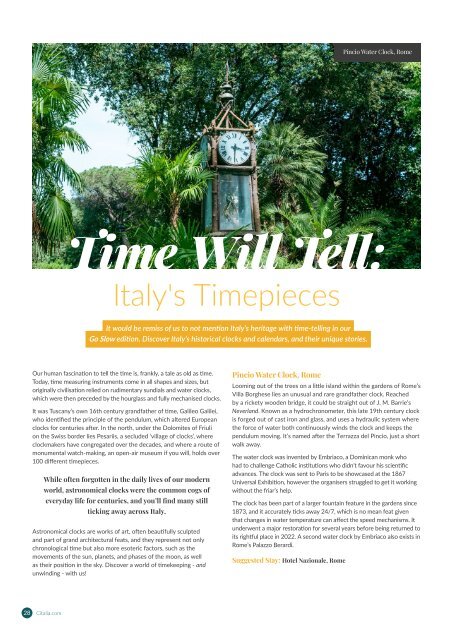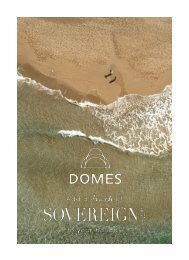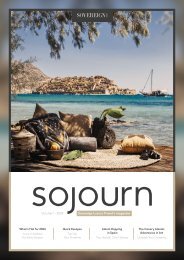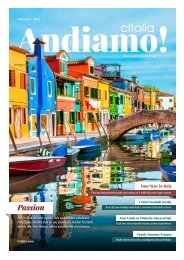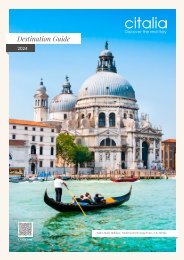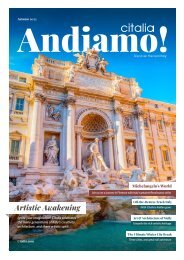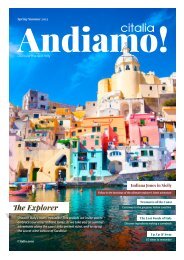Andiamo! Citalia Magazine Winter 2023
This issue focuses on laidback living and going slow, swapping the bustling cities for the serene coast and countryside in our Unmissable Destinations for 2023 article. Hop on board with Italy’s Railway Rides and discover the real Italy as you travel across the country. Combine a few destinations together and enjoy a multi-centre trip, ticking off more of that bucket list – it’s so easy to get around by rail! Look forward to a night at the opera as we celebrate One Hundred Years of Opera at the Arena in Verona. This is one event not to be missed in 2023!
This issue focuses on laidback living and going slow, swapping the bustling cities for the serene coast and countryside in our Unmissable Destinations for 2023 article.
Hop on board with Italy’s Railway Rides and discover the real Italy as you travel across the country. Combine a few destinations together and enjoy a multi-centre trip, ticking off more of that bucket list – it’s so easy to get around by rail!
Look forward to a night at the opera as we celebrate One Hundred Years of Opera at the Arena in Verona. This is one event not to be missed in 2023!
You also want an ePaper? Increase the reach of your titles
YUMPU automatically turns print PDFs into web optimized ePapers that Google loves.
Pincio Water Clock, Rome<br />
Time Will Tell:<br />
Italy's Timepieces<br />
It would be remiss of us to not mention Italy’s heritage with time-telling in our<br />
Go Slow edition. Discover Italy’s historical clocks and calendars, and their unique stories.<br />
Our human fascination to tell the time is, frankly, a tale as old as time.<br />
Today, time measuring instruments come in all shapes and sizes, but<br />
originally civilisation relied on rudimentary sundials and water clocks,<br />
which were then preceded by the hourglass and fully mechanised clocks.<br />
It was Tuscany’s own 16th century grandfather of time, Galileo Galilei,<br />
who identified the principle of the pendulum, which altered European<br />
clocks for centuries after. In the north, under the Dolomites of Friuli<br />
on the Swiss border lies Pesariis, a secluded ‘village of clocks’, where<br />
clockmakers have congregated over the decades, and where a route of<br />
monumental watch-making, an open-air museum if you will, holds over<br />
100 different timepieces.<br />
While often forgotten in the daily lives of our modern<br />
world, astronomical clocks were the common cogs of<br />
everyday life for centuries, and you’ll find many still<br />
ticking away across Italy.<br />
Astronomical clocks are works of art, often beautifully sculpted<br />
and part of grand architectural feats, and they represent not only<br />
chronological time but also more esoteric factors, such as the<br />
movements of the sun, planets, and phases of the moon, as well<br />
as their position in the sky. Discover a world of timekeeping - and<br />
unwinding - with us!<br />
Pincio Water Clock, Rome<br />
Looming out of the trees on a little island within the gardens of Rome’s<br />
Villa Borghese lies an unusual and rare grandfather clock. Reached<br />
by a rickety wooden bridge, it could be straight out of J. M. Barrie’s<br />
Neverland. Known as a hydrochronometer, this late 19th century clock<br />
is forged out of cast iron and glass, and uses a hydraulic system where<br />
the force of water both continuously winds the clock and keeps the<br />
pendulum moving. It’s named after the Terrazza del Pincio, just a short<br />
walk away.<br />
The water clock was invented by Embriaco, a Dominican monk who<br />
had to challenge Catholic institutions who didn’t favour his scientific<br />
advances. The clock was sent to Paris to be showcased at the 1867<br />
Universal Exhibition, however the organisers struggled to get it working<br />
without the friar’s help.<br />
The clock has been part of a larger fountain feature in the gardens since<br />
1873, and it accurately ticks away 24/7, which is no mean feat given<br />
that changes in water temperature can affect the speed mechanisms. It<br />
underwent a major restoration for several years before being returned to<br />
its rightful place in 2022. A second water clock by Embriaco also exists in<br />
Rome’s Palazzo Berardi.<br />
Suggested Stay: Hotel Nazionale, Rome<br />
28<br />
<strong>Citalia</strong>.com


